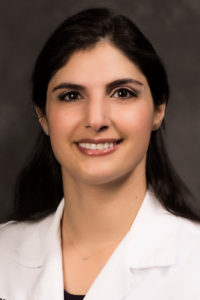
Picture this: You’re a woman surgeon in a patient exam room explaining that person’s medical problem, what kind of surgery is indicated, how that surgery is done, what the risks and benefits are, and at the end of the conversation, the patient, says, “Who is going to do my surgery?”
Those types of questions and expertise undermining are far too common in the workplace for women, said Arghavan Salles, MD, PhD, who has experienced this question before. She, of course, is the one doing the surgery because she is a rigorously trained surgeon, one who the patient has paid to see.
Dr. Salles, a founding member of TIME’S UP Healthcare, will address the different challenges women face in the health-care workplace and initiatives being implemented to “unify national efforts to bring safety, equity, and dignity to our healthcare workplace”—the mission of the TIME’S UP Healthcare organization—during Monday’s Women & Pulmonary Luncheon and Networking Hour in rooms 394-396 of the convention center. Follow the #CHESTwomen hashtag for live updates during the meeting and other women-focused sessions.
The challenges women face are many, including harassment, pay gaps, and undervalued opinions, which can end up being costly. Women spend a lot of time having to prove they have the expertise their degree and training has given them, as illustrated in the example above.
“The time spent to win people over and convince them that the plans we come up with are reasonable and appropriate is time we’re not taking care of another patient, doing research, or something else that’s productive,” Dr. Salles said. “All of that is lost productivity. That can also result in very real negative consequences in patient care.”
The activities women get involved with in the workplace tend to not be valued by leadership (like education and service), she explained. Women often take the charge on many of the “invisible” tasks around the workplace that people don’t want to do but have to be done, such as making the coffee in the morning, ordering supplies, etc.
“Women are working just as hard as men, if not harder, but they’re not being valued for the type of work they’re doing, which is very challenging,” Dr. Salles said. “This results in differences in promotion, retention, and even hiring to begin with.”
Dr. Salles focuses her research on diversity, equity, and inclusion. Her PhD work examined how gender stereotypes affect women training to be surgeons, and she has continued doing work in that area for the past decade. Some of her research includes raising awareness for implicit bias. Her research on implicit bias shows that both men and women who work in health care associate men with careers and women with family. Surgeons associate men with surgery and women with family medicine.
TIME’S UP Healthcare is a solutions-focused organization focusing on initiatives that speak to its mission. The group is asking medical and health-care organizations to sign onto basic principles stating that sexual harassment and gender inequity have no place in health care, that every employee should have equitable opportunity, support, and compensation, and that they will measure and track sexual harassment and gender-based inequities occurring at their institution.
Dr. Salles said TIME’S UP Healthcare has close to 50 signatories to those three basic tenants. Many other solutions and initiatives are in the works.
Another way to combat gender issues in the workplace is by establishing allies in the workplace, Dr. Salles said. A man or woman can try and shift a conversation back to a woman who was interrupted or whose idea was hijacked during a meeting.
“Amplifying women’s ideas can be helpful in making sure we give credit to the right people,” she said. “We can work with our colleagues to work together.”
And remember, you’re not alone in these struggles.
“It can be very isolating, and you can feel like you’re the only one in a bad situation,” she said. “There can be some self-blame, guilt, and shame, but it’s important for people to realize those same experiences are being had by the same people in a lot of different places.”
Dr. Salles said it’s also important to recognize your value as a woman and negotiate for people to see that value as well.
“I think that as physicians, we often under-value ourselves,” Dr. Salles said. “It’s really important for us to know that being a woman doesn’t make us less a physician. We still train just as hard and just as long. We have the same level of expertise and knowledge as our male colleagues, and we deserve to be treated that way by patients, colleagues, and other health-care workers.”
Please join the CHEST Foundation at the Women & Pulmonary Luncheon. Reservations are required and are on a first-come, first-served basis. Following the luncheon and new this year, attendees will have the opportunity to intimately network with key CHEST members and leadership.
Also, show your support at the Women & Pulmonary Luncheon and get our Women & Pulmonary pin! For a $20 donation, receive your Women & Pulmonary pin to show your support of the program’s initiatives. All proceeds support the CHEST Foundation’s Women & Pulmonary program.





